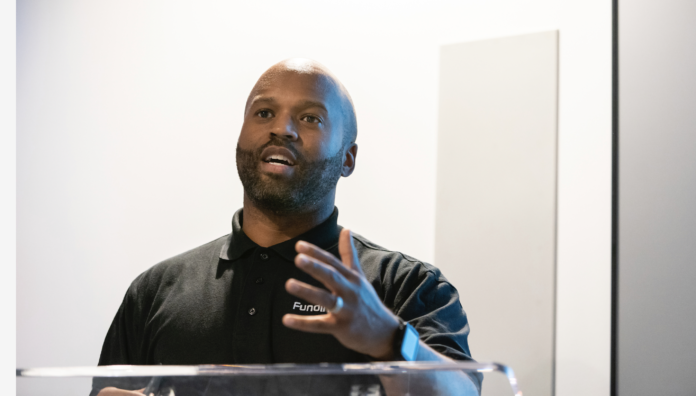Dear Fathers, meet Pedro Moore.
Pedro Moore, a Delaware-based Venture Capital advisor and entrepreneur has been obsessed with leveling the playing field for Black Americans in business since he could crawl. Not only in starting a business but with how to close the wealth gap. The unassuming millionaire next door that is Pedro Moore is a venture Advisor to the people’s Shark, Daymond John of the hit tv show Shark Tank, who is the Founder of Fubu. Pedro speaks all over the country on what it will take for Black wealth to catch up with non-Black wealth. Check out our interview with him below.
Pedro’s journey as an entrepreneur and his experience in the world of venture capitalism.
I began my entrepreneurship journey at the age of eight, working on his grandfather’s farm. Pedro harvested cantaloupe, watermelon, and even pecans from this farm and sold them to the local community or grocery store. Despite making only a few dollars, it was my first experience with entrepreneurship and I didn’t have to ask my mom for candy money. It was my own.
In my school days, I sold video game codes, music, candy, etc. – as an adult, I co-founded Delaware’s first coworking space and bubble soccer company. Later, became a venture capitalist investing in technology startups at their series A stage. We invested $250K- $750K into primarily enterprise technology. As a result of this experience, I eventually partnered with Daymond John of Shark Tank, where I vetted his deals for the show.
How do you balance the role of Fatherhood while being an entrepreneur?
As our lives and businesses evolve, roles need to change as well. Also, if anyone claims to have figured it out, they are lying.
In order to balance my role as a father and entrepreneur, I drink lots of caffeine and become an efficient time manager. Focusing not necessarily on the length of time but rather on the quality of time spent on work or kids. For instance, my oldest loves working on science projects from the green box he receives every month from the Kiwi company. Therefore, I budget time for us to do that. When it’s time to work on the science project, I give him my full attention – even if it’s only 15 minutes. After that, I left for work, and I believe that was sufficient for him since he had daddy’s full attention, and now he says, “I like building things with daddy.” I gave him a memorable experience. My second son is only 7 months old, so he doesn’t require much attention, but I do hold up and talk to him here and there throughout the day. When he gets older, my game plan may have to change again.
Do you find it important to teach your kids the importance of entrepreneurship, or will you let them find their own way as they get older?
Years ago, I would have, even though I am one of the most passionate people about entrepreneurship. However, I understand that starting a business does not close a wealth gap and that there are multiple ways to build wealth and own equity in a business. Therefore, I focus on teaching my sons a high skill that can earn a living. Still, I also emphasize that they need to own valuable assets, either investing passively or actively managing them. Many entrepreneurs live paycheck to paycheck today and are struggling financially compared to those who work a 9-5. My oldest loves science, so I expose him to Lonnie Johnson, inventor of SuperSoaker, to show there are multiple paths to wealth creation.

How did the relationship you had with your father impact the way you raise your kids as well as your career path? Was there any influence?
Growing up, my father played a crucial role in exposing me to a diverse range of experiences. Despite not living with him, he made sure to take me to Disney World and introduce me to the world of cars. He also taught me invaluable skills such as investing in stocks and technology. As a result, I have developed a keen interest in these areas and now strive to pass on the same knowledge to my own son. In fact, I make it a point to expose him to a wide variety of activities and experiences, hoping that he too will discover his passions and interests.
Pedro’s thoughts on wealth accumulation and any insights he can share about leaving a legacy and inheritance planning.
You must own business equity or property to build wealth, but you must also teach your kids the value of money and wealth. It is possible to transfer everything to the child’s name, and they will blow it all away.
This summer, I buried my mother, who taught me a few things about wealth – As your parents get older, you should start transferring assets out of their names. For instance, Medicaid will make a person sell all their assets if he or she gets sick and needs Medicaid. A timely transfer of assets from the parent’s name to a trust or a child’s name could help prevent that.
When it comes to leaving a legacy, it’s first teaching my kids about Christ, money, and life and providing them with assets that will help them succeed in life.
When it’s all said and done, what do you want people to say about Pedro the Father and Pedro the businessman?
Pedro is a loving father who sets a good example for his children. He is a knowledgeable businessman who has helped hundreds of entrepreneurs to grow their businesses and close the wealth gap in their communities. Pedro has enabled these entrepreneurs to turn their businesses into buyable assets, thus creating wealth and prosperity in their local areas.
Any advice for fathers also balancing their entrepreneurial journey while raising their kids?
Be patient, flexible, ask for help, delegate. It’s okay to take your time teaching your child to ride a bike or anything else.





